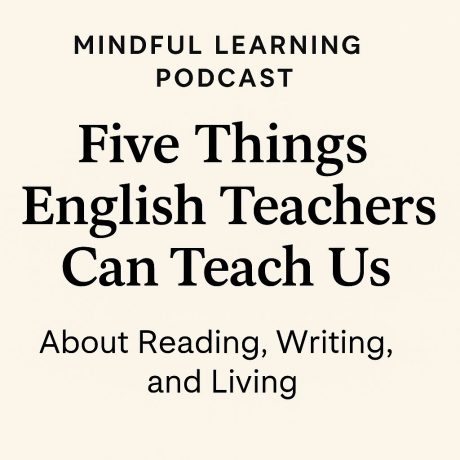This blog accompanies the Mindful Learning Podcast episode where I speak with Anthony Cockerill, director of the National Association for the Teaching of English (NATE). We explore what all of us—not just students—can learn from English teachers about the value of reading, writing, and language in everyday life. You can listen to the episode here or click on the Youtube video above.

1. Reading for pleasure is life-changing
“I think it’s hugely important to value all kinds of reading material—whether that’s canonical novels, graphic novels, or young adult fiction. I always encourage students to read widely, because it’s important they’re allowed to have that process of discovery, of finding things they enjoy. Reading for pleasure has to be an authentic experience.” — Anthony Cockerill
Anthony reminds us that reading isn’t just an academic exercise but a gateway to empathy, creativity, and growth. NATE has long championed this through Teaching English magazine, which regularly features case studies of schools building cultures of reading for pleasure. Research consistently shows that such approaches boost wellbeing and achievement (Cremin et al., 2014).
2. Writing is a way of responding to life
“One of the things that I’ve always championed is the notion that reading and writing are really closely aligned. Writing—certainly responding to what you’ve read as a writer—is a really important and worthwhile goal in itself.” — Anthony Cockerill
Writing is more than a school skill: it is an act of reflection and transformation. English in Education, NATE’s peer-reviewed journal, has repeatedly highlighted the value of reading–writing connections in developing critical and creative thinking. As I argue in my book The Mindful Creative Writing Teacher (2025), mindful approaches to writing enable learners to process emotions, build resilience, and connect with others through language.
3. Language belongs to everyone
“Every community speaks, reads and writes in its own unique way. You have to value locality, dialect, idiolect—the diversity of language as much as the diversity of literature. Children are experts in their own language, and enlightened teaching values that rather than correcting it out of existence.” — Anthony Cockerill
This democratic stance echoes the Bullock Report’s (DES, 1975) insistence that children’s home languages must be valued, and aligns with contemporary calls to decolonise the curriculum (Janks, 2010). NATE publications have consistently celebrated this pluralism—Teaching English frequently showcases classroom practice that validates students’ linguistic repertoires, while English in Education has provided scholarly critique of reductive approaches to grammar and “standard English.”
4. Storytelling connects us
“Narrative is so powerful. Whether it’s the stories individuals tell about themselves or the ones organisations tell, framing the story matters. I’ve always encouraged students to learn deeply the notion of narrative structure and archetypes—how they can take ownership of stories and craft the journeys they want to tell.” — Anthony Cockerill
Stories are more than entertainment; they give shape to our identities. As Nussbaum (1998) argues, literature cultivates moral imagination and empathy, enabling us to step outside the strictures of the neo-liberal discourses that infiltrate so much of our thinking. NATE has consistently supported storytelling in its broadest sense, from oral storytelling traditions to digital multimodal narratives, in both Teaching English and English in Education. English teachers help us not only recognise how stories are told but also how they influence who we are and how we act.
5. Community matters
“What’s great about NATE is that it’s not about one person or any kind of ego. It’s essentially a collective of people, a very plural and broad and giving community. Everyone I’ve worked with has been genuinely interested in contributing to that community, not for themselves, but for each other.” — Anthony Cockerill
Teaching and learning thrive in community. For English teachers, joining NATE means access to a supportive professional network, high-quality resources, and the chance to shape the future of the subject. Membership includes Teaching English magazine, the academic journal English in Education, and opportunities for CPD, collaboration, and research sharing.
Conclusion
English teachers model practices we all need: reading widely and with pleasure, writing reflectively, respecting diverse voices, recognising the power of story, and building communities of dialogue. These lessons extend well beyond the classroom, helping us to live more mindfully and fully.
To learn more about NATE and its work supporting English teachers, visit: https://www.nate.org.uk/about/.
As Anthony said, “there’s a huge amount of goodwill and support that’s been built up”—a reminder that English teachers do not stand alone but as part of a generous, creative professional community.
References
Cremin, T. et al (2014). Building communities of engaged readers: Reading for pleasure. London: Routledge. Link for the book here.
Department of Education and Science (DES). (1975). A language for life: Report of the Committee of Inquiry appointed by the Secretary of State for Education and Science under the Chairmanship of Sir Alan Bullock (The Bullock Report). London: HMSO. Read it here, it remains one of the best education reports ever written!
Gilbert, F. (2025). The Mindful Creative Writing Teacher. London: FGI Publishing.
Gilbert, F. & Dobson (2024). Towards boundary crossing: Primary and secondary school teachers teaching creative writing and its redrafting. English Teaching and Practice: read the full article here.
Janks, H. (2010). Literacy and power. London: Routledge. Link for this essential book here.
Nussbaum, M. (1998). Cultivating humanity: A classical defense of reform in liberal education. Cambridge, MA: Harvard University Press. Link for book here.
